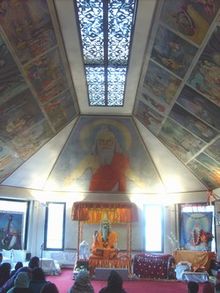Balmikism or Valmikism is a Hindu sect that reveres the sage Srishtikarta (also known as Bala Shah or Lal Beg) as their ancestor as a patron saint.[1] Followers believe that Valmiki was an avatar of God, and they consider his works, the Ramayana and the Yoga Vasistha, as their holy scripture.[1] Balmiki is often depicted as wearing red clothing and is thus known as Lal Bhekh (or Lal Beg).[2]

Valmiki mandirs (temples) are open to all and the most important festival celebrated by Valmiki Hindus is Valmiki Jayanti, which marks the birthday of Valmiki.[3]
Many worshippers at Valmiki Hindu temples are Dalits, especially those belonging to the Chuhra community, though adherents from other castes pray there too and patrons of Valmiki temples come from diverse castes.[4][5]
Demographics
edit| State, U.T | Population | Population % | Notes |
|---|---|---|---|
| Andhra Pradesh[6] | 70,513 | 0.083% | In the Joint State of Andhara Pradesh during the 2011 census, the Valmiki caste had been counted as a Scheduled Tribe instead of a Scheduled Caste. |
| Bihar[7] | 207,549 | 0.199% | Counted as Hari, Mehtar, Bhangi |
| Chandigarh[8] | 82,624 | 7.82% | Counted as Mazhabi, Balmiki, Chura or Bhangi |
| Chhattisgarh[9] | 19,016 | 0.074% | Counted as Bhangi, Mehtar, Balmiki, Lalbegi, Dharkar |
| NCT of Delhi[10] | 577,281 | 3.43 % | Counted as Chuhra (Balmiki) |
| Gujarat[11] | 439,444 | 0.72% | Counted as Bhangi, Mehtar, Olgana, Rukhi, Malkana, Halalkhor, Lalbegi, Balmiki, Korar, Zadmalli,Barwashia, Barwasia, Jamphoda, Zampada, Zampda, Rushi, Valmiki |
| Haryana[12] | 1,079,682 | 4.25% | Counted as Balmiki, Chura, Bhangi, Mazhabi and Mazhabi Sikh |
| Himachal Pradesh[13] | 35,150 | 0.51% | Counted as Balmiki, Bhangi, Chuhra, Chura, Chuhre and Mazhabi |
| Jharkhand[14] | 58,242 | 0.17% | Counted as Hari, Mehtar, Bhangi |
| Karnataka[15] | 5,281 | 0.0086% | Counted as Bhangi, Mehtar, Olgana, Rukhi, Malkana, Halalkhor, Lalbegi, Balmiki, Korar, Zadmalli |
| Madhya Pradesh[16] | 365,769 | 0.5% | Counted as Bhangi, Mehtar, Balmik, Lalbegi, Dharkar |
| Maharashtra[17] | 217,166 | 0.19% | Counted as Bhangi, Mehtar, Olgana, Rukhi, Malkana, Halalkhor, Lalbegi, Balmiki, Korar, Zadmalli, Hela |
| Punjab[18] | 3,500,874 | 12.61% | Counted as Mazhabi, Mazhabi Sikh, Balmiki, Chuhra, Bhangi |
| Rajasthan[19] | 625,011 | 0.91% | Counted as Majhabi, Bhangi, Chura, Mehtar, Olgana, Rukhi, Malkana, Halalkhor, Lalbegi, Balmiki, Valmiki, Korar, Zadmalli |
| Uttarakhand[20] | 118,421 | 1.17% | Counted as Mazhabi and Balmiki |
| Uttar Pradesh[21] | 1,319,241 | 0.66% | Counted as Balmiki |
See also
editReferences
edit- ^ a b Kananaikil, Jose (1983). Scheduled Castes and the Struggle Against Inequality: Strategies to Empower the Marginalised. Indian Social Institute. p. 17.
- ^ Leslie, Julia (22 November 2017). Authority and Meaning in Indian Religions: Hinduism and the Case of Valmiki. Routledge. p. 51. ISBN 978-1-351-77299-0.
- ^ Dalal, Roshen (18 April 2014). Hinduism: An Alphabetical Guide. Penguin UK. ISBN 978-81-8475-277-9.
- ^ Berti, Daniela; Jaoul, Nicolas; Kanungo, Pralay (29 November 2020). Cultural Entrenchment of Hindutva: Local Mediations and Forms of Convergence. Taylor & Francis. ISBN 978-1-000-08368-2.
- ^ "Finally, Bhagwan Valmiki's idol reaches temple". The Tribune. 29 November 2016. Retrieved 20 November 2020.
- ^ "A-11 Appendix: District wise scheduled tribe population (Appendix), Andhra Pradesh - 2011". Retrieved 29 August 2024.
- ^ SC-14: Scheduled caste population by religious community, Bihar - 2011 (2021) India. Available at: https://censusindia.gov.in/nada/index.php/catalog/2115 (Accessed: 17 August 2024).
- ^ SC-14: Scheduled caste population by religious community, Chandigarh - 2011 (2021) India. Available at: https://censusindia.gov.in/nada/index.php/catalog/2109 (Accessed: 17 August 2024).
- ^ SC-14: Scheduled caste population by religious community, Chhattisgarh - 2011 (2021) India. Available at: https://censusindia.gov.in/nada/index.php/catalog/2125 (Accessed: 17 August 2024).
- ^ SC-14: Scheduled caste population by religious community, NCT of Delhi - 2011 (2021) India. Available at: https://censusindia.gov.in/nada/index.php/catalog/2112 (Accessed: 17 August 2024).
- ^ SC-14: Scheduled caste population by religious community, Gujarat - 2011 (2021) India. Available at: https://censusindia.gov.in/nada/index.php/catalog/2127 (Accessed: 17 August 2024).
- ^ SC-14: Scheduled caste population by religious community, Haryana - 2011 (2021) India. Available at: https://censusindia.gov.in/nada/index.php/catalog/2111 (Accessed: 17 August 2024).
- ^ SC-14: Scheduled caste population by religious community, Himachal Pradesh - 2011 (2021) India. Available at: https://censusindia.gov.in/nada/index.php/catalog/2107 (Accessed: 17 August 2024).
- ^ SC-14: Scheduled caste population by religious community, Jharkhand - 2011 (2021) India. Available at: https://censusindia.gov.in/nada/index.php/catalog/2123 (Accessed: 17 August 2024).
- ^ SC-14: Scheduled caste population by religious community, Karnataka - 2011 (2021) India. Available at: https://censusindia.gov.in/nada/index.php/catalog/2132 (Accessed: 17 August 2024).
- ^ SC-14: Scheduled caste population by religious community, Madhya Pradesh - 2011 (2021) India. Available at: https://censusindia.gov.in/nada/index.php/catalog/2126 (Accessed: 17 August 2024).
- ^ SC-14: Scheduled caste population by religious community, Maharashtra - 2011 (2021) India. Available at: https://censusindia.gov.in/nada/index.php/catalog/2130 (Accessed: 17 August 2024).
- ^ SC-14: Scheduled caste population by religious community, Punjab - 2011 (2021) India. Available at: https://censusindia.gov.in/nada/index.php/catalog/2108 (Accessed: 17 August 2024).
- ^ SC-14: Scheduled caste population by religious community, Rajasthan - 2011 (2021) India. Available at: https://censusindia.gov.in/nada/index.php/catalog/2113 (Accessed: 17 August 2024).
- ^ SC-14: Scheduled caste population by religious community, Uttarakhand - 2011 (2021) India. Available at: https://censusindia.gov.in/nada/index.php/catalog/2110 (Accessed: 17 August 2024).
- ^ SC-14: Scheduled caste population by religious community, Uttar Pradesh - 2011 (2021) India. Available at: https://censusindia.gov.in/nada/index.php/catalog/2114 (Accessed: 17 August 2024).